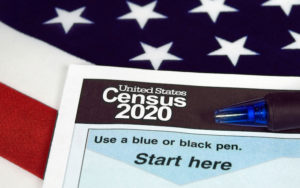
The Census Bureau asks for state drivers’ license information, the Trump Administration lifts a logging ban in Alaska, and more…
IN THE NEWS
- Although the U.S. Supreme Court prohibited adding a citizenship question to the 2020 census, the U.S. Census Bureau asked states to share drivers’ licenses to verify the citizenship status of those who have responded to the census. “It’s really just an act that’s going to instill a lot of fear,” Jennifer Lee, a professor at the Temple University Beasley School of Law, reportedly argued. The Census Bureau stated that it will not share any data with any other government agency or with law enforcement authorities.
- The U.S. Department of Agriculture issued a proposed rule that would open a portion of Alaska’s Tongass National Forest to commercial logging. U.S. Senator Lisa Murkowski (R-Alaska) requested in 2017 that Tongass be exempted from a logging ban in designated national forests, citing the need to “create new opportunities for our struggling communities, provide good jobs for thousands of Alaskans, and still fully protect our lands and waters.” U.S. Senator Maria Cantwell (D-Wash.), a senior member of the Senate Committee on Energy and Natural Resources, criticized the proposed rule, saying that “the vast majority of Americans want to see the Tongass protected.”
- The Michigan Court of Claims temporarily blocked an emergency order by the Michigan Department of Health and Human Services that had imposed a statewide ban on flavored e-cigarettes. Judge Cynthia Stephens found that two e-cigarette businesses who filed suit challenging the ban had shown a likelihood of irreparable harm and were likely to succeed on their claim that an emergency order was not warranted. Vowing to appeal, Michigan Governor Gretchen Whitmer (D) said that the decision “misreads the law and sets a dangerous precedent of a court second-guessing the expert judgment of public health officials dealing with a crisis.”
- The National Highway Traffic Safety Administration announced plans to revamp its safety testing program for new vehicles. “Far too many American families still lose loved ones every year, and we firmly believe that vehicles can and should be even safer in the future,” said agency acting administrator James Owens. The announcement came a day before a planned press event by Advocates for Highway and Auto Safety to advocate for bringing U.S. safety standards in line with international norms.
- The U.S. Department of Homeland Security issued a final rule clarifying that, under the REAL ID Act, federal agencies cannot accept any non-compliant driver’s licenses or identification cards for any official federal purpose. States can continue to issue non-compliant identification cards, but the cards must indicate clearly that they cannot be used for federal purposes. Card-based enforcement begins next year on October 1, 2020.
- The State Water Resources Control Board of California adopted a plan that will require the agricultural industry to prevent its nitrates and salts from seeping into groundwater. The plan will require nitrate dischargers to eliminate all groundwater contamination within the next 35 years. State Water Board Chair Joaquin Esquivel said, “This plan is a better, more durable solution because it represents the work of diverse interests coming together to find common ground.”
- The U.S. Court of Appeals for the Fourth Circuit agreed to re-hear a lawsuit by Washington, D.C. and the state of Maryland against President Donald J. Trump in front of the full court. The lawsuit alleges that the President violated the U.S. Constitution’s prohibition against federal officials profiting from interactions with foreign governments. “We look forward to arguing our case before the full panel to stop President Trump from violating the Constitution and profiting from the presidency,” the D.C. and Maryland Attorneys General said in a statement.
- The U.S. Consumer Financial Protection Bureau (CFPB) announced the creation of a task force to evaluate current consumer protection laws for regulatory gaps or unnecessary complexity. Bill Himpler, president and CEO of the American Financial Services Association, welcomed the announcement, noting that “the financial services and consumer credit industries, as well as consumer needs, have evolved dramatically in just the past decade.”
- The U.S. Department of Defense’s Office of Inspector General will review the military’s use of per- and polyfluoroalkyl substances (PFAS)—chemicals linked to cancer and hormone disruption. The Inspector General’s investigation comes at the request of a bipartisan congressional PFAS Task Force led by U.S. Representatives Dan Kildee (D-Mich.) and Brian Fitzpatrick (R-Pa.). In response to increasing evidence of PFAS-contaminated drinking water on military bases, the task force advocates better control and cleanup of toxic substances on Defense Department land.
WHAT WE’RE READING THIS WEEK
- The decline of the coal industry over the last decade is the result of market forces and not of environmental regulation implemented during the Obama Administration, according to a new report by Cary Coglianese of the University of Pennsylvania Law School and Daniel Walters of the Penn State Law School. Coglianese and Walters tracked stock prices for publicly traded coal firms before and after key regulatory developments from 2008 to 2017 and found no consistent support for the Trump Administration’s narrative that environmental regulation is responsible for the coal industry’s decline. Such claims of a “regulatory war on coal” appear more likely to be signs of regulatory scapegoating, Coglianese and Walters concluded. Such scapegoating of regulation is cause for concern given its power to impact policy-making should officials fail to recognize the distinction between rhetoric and reality, they argued.
- American political conservatives have performed an intellectual about-face on cost-benefit analysis, Professor Amy Sinden of the Temple University Beasley School of Law argued in an article for The American Prospect. According to Sinden, conservatives and industry lobbyists popularized the idea that the benefits of a new regulation should outweigh its costs, on the assumption that governmental use of cost-benefit analysis would discourage regulation and promote the free market. But recent developments showing that the benefits of regulations often far outweigh costs have undermined the tool’s deregulatory bent, she claimed. In response, Sinden argued, industry groups have proposed reforms to cost-benefit analysis—such as discounting the indirect benefits of regulation or imposing a budget cap for new rules—that are untethered from the free-market principles that conservatives claim to revere.
- In an op-ed for The New York Times, Professor Paul Krugman of the City University of New York argued that President Trump’s deregulatory efforts have more to do with psychology than self-interest. He points out that many regulations intended to protect the public, such as a seatbelt mandate, have experienced fierce backlash from what was seen as government intervention. This backlash, however, may not represent most Americans, as Krugman highlighted data showing that the majority of Americans want to strengthen—not loosen—pollution regulation.
FLASHBACK FRIDAY
- In a 2017 essay for The Regulatory Review, Rick Reibstein of Boston University’s Department of Earth & Environment critiqued a U.S. Department of Commerce report advocating the reduction of regulatory burdens on the manufacturing sector. The report, Reibstein argued, revealed a half-truth by considering the costs of regulation without assessing its benefits. Reibstein concluded that the Trump Administration’s executive order to repeal two or more existing regulations for each new regulation issued—and the order’s progeny, including the Commerce Department’s report—err in focusing on decreasing the number of regulations rather than on the opportunity to increase efficiency and streamline permitting processes through regulatory improvements.



